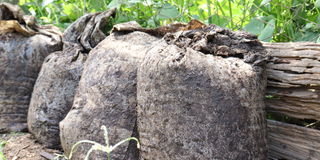How Nakuru farmer has turned organic manure into money-making product

Some of the packed manure ready for sale.
It is not uncommon to find an abandoned stockpile of manure on underdeveloped roads in peri-urban areas.
This manure, when accumulated, can cause health, odour and pest problems if not properly managed, especially for peri-urban livestock farmers.
An option to discard the waste is to collect it daily and spread it on cropland. For many small-scale farmers, this may be a problem.
Esther Bonita, a farmer in Nakuru's Pipeline estate and founder of Afripot Solutions, got tired of this problem and devised a solution to help other urban and peri-urban farmers unload their animal manure by adding value.

Esther Bonita (center) training farmers on the process of fortified composting.
“As a poultry farmer, for a long time, getting rid of the waste from my birds was challenging. I also discovered that my neighbour, who has multiple cows, was experiencing similar difficulties. This prompted me to take action,” Bonita recalls.
“I started by collecting neighbourhood waste and composting it for my kitchen garden while my neighbours transported their portions to their farms in far areas. But still, we had so much waste. I thus decided to make fortified compost, after receiving training on regenerative agriculture, to add nutrients like nitrogen, usually lost when doing normal composting,” she says.
The fortified compost consists of things like plant protein (market waste), biochar (charcoal dust)- which helps with water retention, and farmyard manure, among other things.
With this, she makes about 100 bags of organic fertilizer, 100 litres of bio pesticides, 200 litres of foliar, and 200 litres of liquid plant protein that all fetch different prices in the market.
Bonita mentions having started the business with about Sh. 100,000.
Although she says it is time and labour-consuming, her eyes are set on creating an environmental-friendly initiative that seeks to help the farming community convert to organic farming owing to its numerous benefits.
Bonita sells the organic fertilizer at Sh. 2,000 at retail, biopesticide at Sh. 700 a litre, foliar at Sh. 800 a litre and liquid plant protein at Sh. 7,000 per ten litres.

Farmers prepare organic manure before packing it for sale.
Organic fertilizers improve soil health and its water-holding capacity, are non-toxic to nature, are easy to use, support the life of organisms living in soil (earthworms), and over and above that, all materials are usually readily available.
“As small-scale farmers, our overreliance on chemical fertilizers has depleted the health of our soils and affected our potential yields. Organic farming has proved, time and again, to be a healthy solution- not only for our soils and the environment by being climate-friendly but also for the well-being of consumers.”
She now collects close to five tons of poultry waste and five lorries of other animal waste per month and hopes to engage big farms that have a problem with waste management and encourage circularity (ensuring waste is reusable) in their farms.
